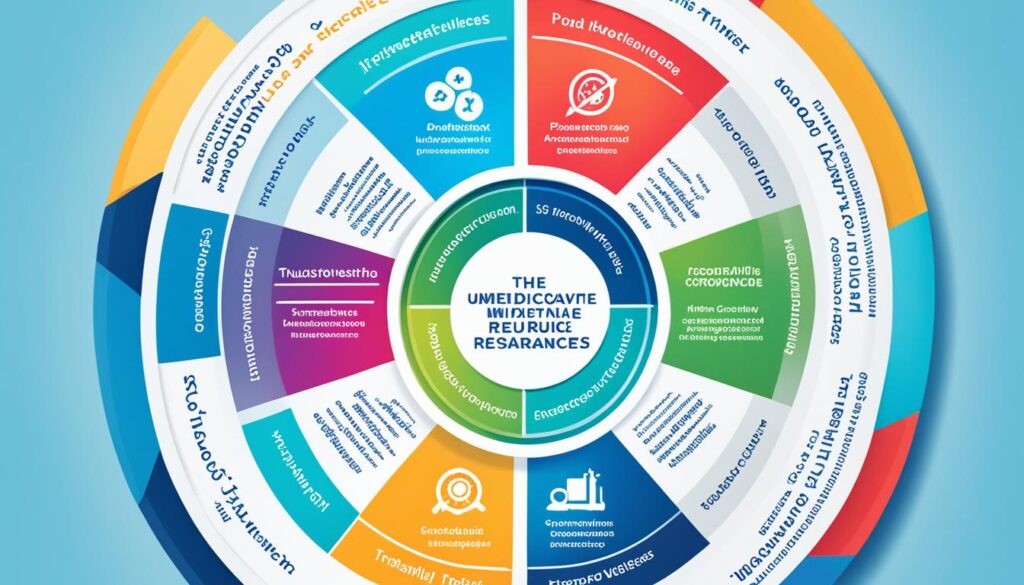Navigating the Medicare application process can be overwhelming, with various complexities and uncertainties. It’s a journey that many people experience at some point in their lives, either for themselves or for their loved ones. When I think back to my initial encounter with Medicare, I recall feeling lost and uncertain about where to begin or how to make the right decisions.
But let me assure you, dear reader, that with the right information and guidance, the Medicare application process can become a manageable journey. And that’s exactly what we’re here to provide – a comprehensive, easy-to-follow guide that will lead you through each step of the process, ensuring that you have a clear path towards obtaining the healthcare coverage you need and deserve.
So take a deep breath, because we’re in this together. Let’s embark on this journey and empower ourselves with the knowledge and resources to successfully apply for Medicare.
Key Takeaways:
- Applying for Medicare can be complex, but with the right guidance, it can be done efficiently.
- Confirm your eligibility by meeting the age or disability requirements.
- Choose between Original Medicare or a Medicare Advantage plan.
- Apply for Medicare online through the Social Security Administration website.
- Be aware of the Medicare enrollment periods and avoid late enrollment penalties.
Confirming Your Eligibility for Medicare
Before you can apply for Medicare, it’s important to confirm that you meet the eligibility requirements. The eligibility requirements for Medicare include:
- Being age 65 or older: Medicare coverage is available to individuals who are at least 65 years old. This is the most common way to become eligible for Medicare.
- Being younger than 65 with a qualifying disability: If you are under 65 and have a qualifying disability, such as end-stage renal disease (ESRD) or certain other conditions, you may be eligible for Medicare.
- Having end-stage renal disease (ESRD): If you have permanent kidney failure requiring dialysis or a kidney transplant, you may be eligible for Medicare regardless of your age.
To determine when you’re eligible for Medicare and estimate your premium amount, you can use the Medicare.gov Eligibility & Premium Calculator. This helpful tool provides personalized information based on your individual circumstances.
| Eligibility Requirement | Description |
|---|---|
| Age 65 or older | Individuals must be at least 65 years old to be eligible for Medicare. |
| Younger than 65 with a qualifying disability | Individuals under 65 with certain disabilities may be eligible for Medicare. |
| End-stage renal disease (ESRD) | Individuals with permanent kidney failure requiring dialysis or a kidney transplant may be eligible for Medicare. |
Choosing Your Medicare Coverage
Now that you’ve confirmed your eligibility for Medicare, it’s time to choose the coverage option that best suits your needs. When it comes to Medicare coverage, you have two main options: Original Medicare (Part A and Part B) or a Medicare Advantage plan (Part C).
Original Medicare provides coverage for hospital stays (Part A) and outpatient care (Part B). With this option, you have the flexibility to see any healthcare provider or specialist who accepts Medicare, giving you more control over your healthcare decisions.
Medicare Advantage plans, on the other hand, are offered by private insurance companies approved by Medicare. These plans provide all the coverage of Original Medicare and often include additional benefits such as prescription drug coverage, vision, dental, and hearing services. Medicare Advantage plans may also offer different cost-sharing arrangements, so it’s important to carefully review the options available in your area.
In addition to considering Original Medicare and Medicare Advantage, you may also need to enroll in Medicare Part D for prescription drug coverage. Medicare Part D is offered through private insurance companies and helps cover the cost of prescription medications.
Comparing Original Medicare and Medicare Advantage
When deciding between Original Medicare and Medicare Advantage, it’s essential to consider your personal healthcare needs and preferences. To help you understand the key differences, here’s a comparison:
| Factor | Original Medicare | Medicare Advantage |
|---|---|---|
| Coverage | Hospital stays (Part A) Outpatient care (Part B) |
Includes all services covered by Original Medicare May include additional benefits like prescription drugs, vision, dental, and hearing services |
| Cost | Monthly premiums for Part B Additional costs for Part A if applicable |
Monthly premiums determined by insurance companies Additional cost-sharing arrangements may apply |
| Provider Network | Can see any healthcare provider who accepts Medicare | May be required to use network providers Potentially limited coverage when traveling |
| Prescription Drug Coverage | Requires separate enrollment in Medicare Part D | May be included in the Medicare Advantage plan |
Note: The above table provides a general overview. It’s important to review the specifics of each plan option available in your area to make an informed decision based on your unique healthcare needs.
To determine the right Medicare coverage option for you, consider factors such as your budget, preferred healthcare providers, and the prescription drugs you take. If you need assistance in comparing plans or understanding the fine print, consider consulting with a licensed insurance agent who specializes in Medicare.
Once you’ve chosen your Medicare coverage option, you can move forward with the application process and take the next step towards securing the healthcare coverage you deserve.

Applying for Medicare Online
Applying for Medicare has never been easier thanks to the convenience of online applications. With just a few simple steps, you can complete your Medicare enrollment from the comfort of your own home.
The Social Security Administration (SSA) is responsible for handling Medicare enrollment, and they offer a streamlined process for applying online through their website. To ensure a smooth application experience, it’s recommended to review the SSA’s Checklist for Online Applications before getting started.
Before you begin your medicare online application, make sure you have all the necessary information handy. You’ll need your personal details, such as your Social Security number, date of birth, and contact information. Additionally, you’ll need information about your current health coverage, including any employer or union coverage you may have.
The online application process typically takes between 10-30 minutes to complete. From entering your personal information to selecting your Medicare coverage options, the online form will guide you through each step. Once you’ve completed the application, you can submit it electronically with just a click of a button.

If you prefer a more traditional approach, you can still apply for Medicare in person at your local Social Security Administration office or by mail. However, applying online offers the convenience of instant submission and eliminates the need for postage or in-person visits.
By applying for Medicare online, you can save time and complete the enrollment process efficiently. Take advantage of this convenient option to ensure you don’t miss out on the essential healthcare coverage provided by Medicare.
Understanding Medicare Enrollment Periods
When applying for Medicare, it’s crucial to understand the different enrollment periods to ensure you don’t miss any important deadlines. Let’s take a closer look at these enrollment periods:
Initial Enrollment Period (IEP)
The Initial Enrollment Period (IEP) is a seven-month window surrounding your 65th birthday when you can first sign up for Medicare. It begins three months before the month of your 65th birthday and ends three months after the month of your 65th birthday.
Annual Enrollment Period (AEP)
Each year, from October 15th to December 7th, there is an Annual Enrollment Period (AEP) during which you can make changes to your Medicare coverage. This is the time to review your current plan, explore other options, and enroll in a plan that better fits your needs.
Special Enrollment Periods (SEPs)
In addition to the IEP and AEP, there are Special Enrollment Periods (SEPs) that allow you to make changes or enroll in Medicare outside of the regular enrollment periods. These SEPs are triggered by certain qualifying events, such as losing employer coverage, moving to a new location, or gaining or losing Medicaid eligibility.
It’s important to note that late enrollment into Medicare may result in penalties, so it’s best to sign up during the appropriate enrollment period. Missing deadlines could lead to higher premiums and delayed coverage.
To help you visualize the different Medicare enrollment periods, here’s a table summarizing the key details:
| Enrollment Period | Period Duration | Eligibility Requirements |
|---|---|---|
| Initial Enrollment Period (IEP) | 7 months | Turning 65 or eligible for Medicare due to disability or end-stage renal disease (ESRD) |
| Annual Enrollment Period (AEP) | October 15th to December 7th | Already enrolled in Medicare |
| Special Enrollment Periods (SEPs) | Varies | Qualifying events, such as losing employer coverage or moving |

By understanding the different Medicare enrollment periods and their importance, you can ensure you enroll in Medicare at the right time and avoid any unnecessary penalties. Stay informed, mark your calendars, and make the most of the available enrollment opportunities.
Avoiding Medicare Late Enrollment Penalties
At Medicare, we understand the importance of timely enrollment and the potential consequences of missing the deadline. By signing up for Medicare during your Initial Enrollment Period (IEP), you can avoid the Medicare late enrollment penalties that can be imposed for not enrolling on time.
The penalties for late enrollment can significantly impact your Medicare coverage and finances. They are added to your monthly premium and can result in higher costs and delayed coverage. It’s crucial to take action and enroll during your Initial Enrollment Period to avoid these penalties.
The specific penalties for not signing up for Medicare on time vary depending on the Medicare Part. Here’s a breakdown of the potential penalties:
- Medicare Part A: If you don’t enroll during your IEP and you’re not eligible for premium-free Part A, you may face a 10% increase in your monthly premium, which will be added for twice the number of years you were eligible but didn’t enroll.
- Medicare Part B: The penalty for late enrollment in Part B is a 10% increase in your monthly premium for each full 12-month period you were eligible but didn’t sign up, and you may have to wait for the General Enrollment Period to enroll, resulting in a gap in coverage.
- Medicare Part D: Late enrollment in Medicare Part D prescription drug coverage can result in a higher premium. The penalty is calculated based on the number of months you were eligible but did not enroll in a Part D plan.
Don’t let Medicare late enrollment penalties impact your coverage and financial well-being. Take advantage of your Initial Enrollment Period and be proactive in signing up for Medicare. By enrolling on time, you can ensure that you have the necessary coverage when you need it most.
To learn more about Medicare enrollment and to understand the specific penalties for each Medicare Part, visit the official Medicare.gov website. You can also consult with a licensed insurance agent who can provide personalized guidance and support throughout the enrollment process.

Takeaways
Signing up for Medicare during your Initial Enrollment Period (IEP) is essential to avoid late enrollment penalties.
The penalties for not signing up on time can result in higher monthly premiums and delayed coverage.
The specific penalties vary for each Medicare Part (A, B, and D).
Enroll on time to ensure you have the necessary coverage and avoid financial consequences.
Exploring Additional Medicare Resources
To better understand Medicare and make informed decisions, it’s helpful to explore additional Medicare resources.
One valuable resource is Medicare.gov, a comprehensive website that provides a wealth of information on costs, coverage, eligibility, and enrollment. It serves as a one-stop-shop for all your Medicare needs, providing detailed explanations and answers to frequently asked questions.

At Medicare.gov, you can access online tools such as the Medicare Plan Finder, which allows you to compare different plans and find the one that best meets your healthcare needs. This tool provides useful information on plan costs, coverage options, and benefits available in your area.
Additionally, Medicare.gov offers educational resources and guides to help you navigate the complexities of Medicare. These resources explain the different parts of Medicare, outline the enrollment process, and provide information on prescription drug coverage.
“Medicare.gov is an invaluable resource for anyone seeking Medicare information. It offers clear and concise explanations, making it easy to understand the basics of Medicare and make well-informed decisions.”
Another valuable resource is speaking with a licensed insurance agent who specializes in Medicare. These professionals can provide personalized guidance and assistance tailored to your specific needs. They can help you understand your coverage options, answer any questions you may have, and help you navigate the Medicare application process.
By leveraging these additional Medicare resources, you can enhance your understanding of the program, explore coverage options, and make informed decisions that best align with your healthcare needs.
Important Documents for Medicare Enrollment
When applying for Medicare, it’s crucial to have certain documents readily available to ensure a smooth application process. These documents are necessary to verify your eligibility and provide essential personal information. Below is a list of the important documents you may need:
- Birth certificate
- Driver’s license or state ID card
- Proof of U.S. citizenship or legal residency
- Social Security card
- W-2 forms (if still employed)
- Military discharge documents (if applicable)
Gathering these documents before starting your Medicare application will save you time and help ensure that you have all the necessary information on hand. Remember, having the right documents ready is essential for a hassle-free enrollment process.
Medicare Enrollment Steps for Adults Under 65
While Medicare is primarily available for individuals who are age 65 or older, there are some cases where individuals under the age of 65 may be eligible. These individuals typically have a qualifying disability or receive Social Security or Railroad Retirement Board disability benefits. The steps for applying for Medicare under 65 are similar to those for individuals age 65 and older, but it’s important to consult with the Social Security Administration or a licensed insurance agent for specific guidance based on your situation.
If you’re under 65 and believe you qualify for Medicare, follow these steps to apply:
- Gather the necessary documents: You’ll need personal identification documents such as your birth certificate, driver’s license or state ID card, proof of U.S. citizenship or legal residency, Social Security card, and any disability benefit documentation.
- Contact the Social Security Administration: Reach out to the Social Security Administration to schedule an appointment or inquire about the application process for Medicare under 65. You can visit their website or call their toll-free number for assistance.
- Submit your application: Complete the Medicare application form, providing accurate information about your eligibility and any disabilities or benefits you receive. Ensure all required documents are attached and submit the application as directed by the Social Security Administration.
- Follow up on your application: After submitting your application, keep track of its progress and follow up with the Social Security Administration if necessary. They may request additional information or documents to process your application.
Remember, the process for applying for Medicare under 65 may differ depending on your specific circumstances. It’s always a good idea to consult with the relevant authorities or seek guidance from a licensed insurance agent who specializes in Medicare to ensure you complete the process correctly and maximize your coverage.
| Steps for Medicare Enrollment Under 65 | Action |
|---|---|
| Gather necessary documents | Collect personal identification documents and disability benefit documentation. |
| Contact the Social Security Administration | Reach out to the Social Security Administration for guidance on the application process. |
| Submit your application | Complete the Medicare application form and attach all required documents. |
| Follow up on your application | Keep track of your application’s progress and provide any additional information requested. |
Note: The above information is a general guide and may not cover all circumstances. It’s advisable to consult with the Social Security Administration or a licensed insurance agent for personalized assistance.
Conclusion
Summing up the Medicare application process may initially seem like a daunting task, but armed with the right guidance and knowledge, it becomes a manageable endeavor. First and foremost, confirming your eligibility is crucial. Ensure that you meet the requirements based on age, disability, or end-stage renal disease. Once confirmed, carefully consider your coverage options – Original Medicare (Part A and Part B) or a Medicare Advantage plan (Part C) – and explore the additional benefits they offer, such as prescription drug coverage.
An essential step to streamline the application process is gathering the necessary documents, including your birth certificate, driver’s license or state ID card, and proof of citizenship or legal residency. Keep an eye on the enrollment periods, particularly the Initial Enrollment Period (IEP) and the Annual Enrollment Period (AEP), to avoid late enrollment penalties. Remember, missing these deadlines can result in higher premiums and delayed coverage.
Don’t hesitate to take advantage of the wealth of resources available for navigating Medicare. Medicare.gov is a comprehensive platform that provides information on costs, coverage, eligibility, and enrollment. You can use their online tools, such as the Medicare Plan Finder, for personalized information and assistance. If you need additional guidance, consider reaching out to a licensed insurance agent who can provide tailored advice based on your specific needs and circumstances.
By following these steps, you can successfully navigate the Medicare application process and secure healthcare coverage that meets your needs. Don’t let the initial complexity overwhelm you. With the right information and resources, applying for Medicare can be a smooth and rewarding experience. Take control of your healthcare journey and ensure you have the coverage you need for a healthier future.
FAQ
How do I apply for Medicare?
To apply for Medicare, you need to confirm your eligibility and then choose your coverage option. Once you’ve done that, you can apply online through the Social Security Administration (SSA) website, in person, or by mail at your local SSA office.
What are the eligibility requirements for Medicare?
Medicare is available for individuals who are age 65 or older, younger than 65 with a qualifying disability, or individuals with end-stage renal disease (ESRD). You can use the Eligibility & Premium Calculator on Medicare.gov to determine if you meet the requirements.
What are my coverage options for Medicare?
You can choose between Original Medicare (Part A and Part B) or a Medicare Advantage plan (Part C). Original Medicare covers hospital stays and outpatient care, while Medicare Advantage plans are offered by private insurance companies and often include additional benefits like prescription drug coverage.
How do I apply for Medicare online?
You can apply for Medicare online through the Social Security Administration (SSA) website. Before applying, it’s recommended to review the SSA’s Checklist for Online Applications to ensure you have all the necessary information. The online application typically takes 10-30 minutes to complete.
What are the Medicare enrollment periods?
The Initial Enrollment Period (IEP) is the seven-month window surrounding your 65th birthday when you can first sign up for Medicare. There is also an Annual Enrollment Period (AEP) from October 15th to December 7th each year when you can make changes to your Medicare coverage. Special Enrollment Periods (SEPs) are available for certain qualifying events.
What are the penalties for late Medicare enrollment?
If you don’t sign up for Medicare during your Initial Enrollment Period (IEP), you may face penalties in the form of higher premiums and delayed coverage. The penalties can vary depending on the specific Medicare part (A, B, or D).
Where can I find additional Medicare resources?
Medicare.gov is a comprehensive website that provides information on costs, coverage, eligibility, and enrollment. You can also use Medicare’s online tools, such as the Medicare Plan Finder, to compare plans. Speaking with a licensed insurance agent can provide personalized guidance.
What documents do I need for Medicare enrollment?
When applying for Medicare, have documents like your birth certificate, driver’s license or state ID card, proof of U.S. citizenship or legal residency, Social Security card, W-2 forms, and military discharge documents (if applicable) ready.
How do adults under 65 apply for Medicare?
Adults under 65 may be eligible for Medicare if they have a qualifying disability or receive certain benefits. The steps for applying are similar to those for individuals age 65 and older, but it’s advised to consult with the Social Security Administration or a licensed insurance agent for specific guidance.









